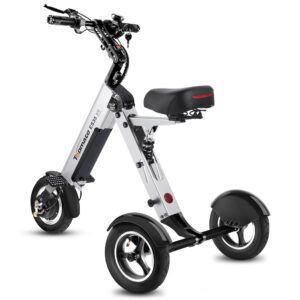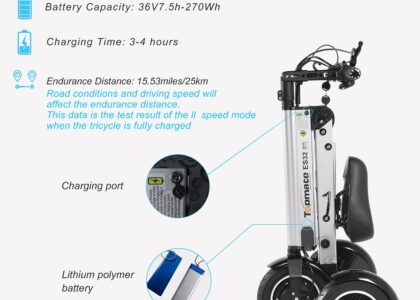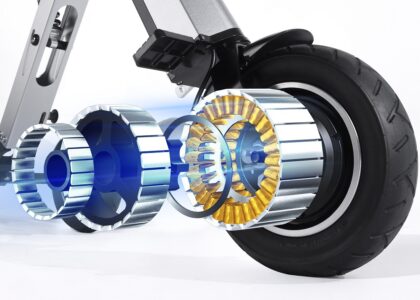In recent years, foldable scooters have surged in popularity, transforming the way people navigate cities. As urban centers become more congested and environmentally conscious, these compact and efficient transport options are offering a sustainable, cost-effective solution for daily commutes. This blog explores the rise of foldable scooters, their design innovations, environmental impact, economic implications, and and what the future holds for urban mobility, and what the future holds for urban mobility.
1. Historical Context of Personal Mobility in Cities
Historical Context of Personal Mobility in Cities
The concept of personal mobility has evolved significantly over time. In the past, bicycles and walking were the dominant forms of transport for city dwellers. As cities expanded, cars became the go-to mode of travel, contributing to traffic congestion, pollution, and parking issues. With the growing need for efficient, eco-friendly alternatives, the foldable scooter has emerged as a modern-day solution that’s both convenient and environmentally conscious.
Emergence of Foldable Scooters as a Transport Solution
Foldable scooters were initially seen as a novelty, catering to a niche market of tech enthusiasts and commuters who wanted an alternative to crowded public transportation. However, with rapid urbanization and the increasing demand for personal mobility solutions, foldable scooters have quickly become a mainstream option. Their compact design and ease of use have made them a popular choice for short-distance travel in cities.
Factors Driving the Popularity of Foldable Scooters
Several factors have contributed to the rising popularity of foldable scooters. The shift towards greener, more sustainable transportation methods has encouraged many urban commuters to adopt foldable scooters. Additionally, the convenience of folding and storing the scooter in tight spaces, such as apartments or office corners, makes it an attractive option for city residents. The rise of e-scooter sharing programs in urban areas has also increased public awareness and acceptance of this mode of transport.
2. Design Innovations in Foldable Scooters
Key Features of Modern Foldable Scooters
Today’s foldable scooters come equipped with a variety of advanced features designed to enhance the user experience. These include lightweight frames, electric motors, longer battery life, and intuitive folding mechanisms. Many models also feature adjustable handlebars, LED lights for night-time visibility, and smartphone connectivity for monitoring speed and battery levels.
Materials and Engineering Advancements
Recent advancements in materials and engineering have greatly improved the durability and performance of foldable scooters. Modern designs use lightweight materials like aluminum and carbon fiber, allowing scooters to be easily carried while maintaining strength and stability. Engineering improvements have also led to better folding mechanisms that ensure quick and easy transitions between riding and carrying.
Balancing Portability and Performance
Manufacturers have successfully struck a balance between portability and performance in scooters. While compact and easy to store, these scooters do not compromise on speed, range, or comfort. Many models are designed for both short and moderate distances, making them ideal for commuting in urban environments. This balance ensures that riders can enjoy a smooth, efficient journey without sacrificing convenience.
3. Environmental Impact of Foldable Scooters
Reduction in Carbon Emissions
One of the biggest advantages of scooters is their positive environmental impact. By choosing a foldable scooter for daily commutes, riders can significantly reduce their carbon footprint. Unlike cars or motorcycles, scooters emit no direct greenhouse gases, helping to alleviate pollution in congested urban areas.
Comparison with Other Modes of Transport
Compared to traditional forms of transport like cars and buses, scooters have a much smaller environmental impact. Even electric cars, while emission-free during use, require substantial energy to produce and charge. Foldable scooters, particularly non-electric models, provide a more sustainable alternative for short-distance travel, making them ideal for eco-conscious commuters.
Sustainability Concerns and Solutions
Although foldable scooters are generally more eco-friendly than cars, there are still concerns about their sustainability, particularly regarding the production and disposal of lithium-ion batteries in electric scooters. Manufacturers are exploring solutions like recyclable battery materials and energy-efficient production methods to make foldable scooters even more sustainable.
4. Economic Implications of the Foldable Scooter Trend
Cost-Effectiveness for Commuters
Foldable scooters offer a cost-effective solution for city commuters. Compared to the ongoing expenses of car ownership—fuel, insurance, parking, and maintenance—scooters require minimal upkeep and no fuel. The initial investment in a foldable scooter quickly pays off, making it a smart choice for budget-conscious commuters.
Impact on Public Transportation Systems
The rise of foldable scooters has also impacted public transportation systems. Many commuters now choose to ride scooters instead of relying on buses or subways, particularly for shorter trips. This shift reduces the strain on public transit systems and may encourage cities to develop infrastructure that accommodates scooters.
Growth of the Foldable Scooter Industry
The growing demand for scooters has spurred the development of a thriving industry. New brands and models are constantly emerging, offering a wide range of options to consumers. As urban mobility continues to evolve, the scooter market is expected to expand further, with innovations that meet the needs of modern commuters.
5. Challenges and Limitations Scooters
Safety Concerns and Regulations
Safety remains a primary concern for scooter users. Although scooters are generally safe for use in city environments, accidents can occur, especially in areas with heavy traffic or poor infrastructure. Cities are beginning to introduce regulations that govern scooter usage, including helmet requirements, speed limits, and designated scooter lanes to improve safety.
Infrastructure Adaptations Needed
For this scooters to become a mainstream form of transportation, cities must adapt their infrastructure. Dedicated scooter lanes, parking spaces, and charging stations for electric models are necessary to support widespread use. As urban planners begin to prioritize alternative modes of transport, these adaptations will become more common.
Weather and Terrain Limitations
Foldable scooters perform best in dry, smooth conditions. Rain, snow, and uneven terrain can pose challenges for riders, limiting their usability in certain climates or environments. However, manufacturers are working on weather-resistant designs that make scooters more versatile in various conditions.

6. The Future of Urban Mobility with Foldable Scooters
Integration with Smart City Technologies
The future of foldable scooters lies in their integration with smart city technologies. As cities embrace connectivity and data-driven transportation systems, foldable scooters could become part of a larger network of urban mobility options. Features like GPS tracking, app-based rentals, and shared scooter programs will likely expand, making scooters an integral part of urban transportation.
Potential for Further Innovations
Innovation in the foldable scooter industry is far from over. From improved battery technology to self-balancing scooters, the possibilities for future developments are exciting. Lightweight, foldable designs will continue to evolve, offering faster, more durable, and more efficient scooters to meet the growing demand.
Predicted Trends in Personal Mobility
As personal mobility continues to evolve, scooters will play a pivotal role in shaping how people move within cities. With increasing environmental awareness, rising fuel costs, and the push for sustainable alternatives, foldable scooters are poised to dominate urban transport for years to come.
Summary
The rise of foldable scooters in urban settings represents a significant shift in personal mobility solutions. With their sleek design, convenience, and positive environmental impact, these scooters offer a smart, sustainable option for city commuters. While there are challenges to overcome, such as safety regulations and infrastructure improvements, the future of foldable scooters looks bright, with ongoing innovations driving their popularity.










